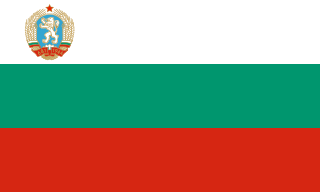At the 1908 Summer Olympics in London, nine wrestling events were contested, all for men. There were four weight classes in Greco-Roman wrestling and five weight classes in freestyle wrestling.

Poland competed at the 1980 Summer Olympics in Moscow, USSR. 306 competitors, 232 men and 74 women, took part in 162 events in 21 sports.

Bulgaria competed at the 1988 Summer Olympics in Seoul, South Korea. Bulgaria ranked 5th overall by medal count with 35 medals won. 171 competitors, 104 men and 67 women, took part in 120 events in 16 sports. The nation returned to the Olympic Games after boycotting the 1984 Summer Olympics.

Bulgaria competed at the 1976 Summer Olympics in Montreal, Quebec, Canada. 158 competitors, 105 men and 53 women, took part in 108 events in 14 sports.

Bulgaria competed at the 1968 Summer Olympics in Mexico City, Mexico. 112 competitors, 102 men and 10 women, took part in 69 events in 13 sports.

Bulgaria competed at the 1964 Summer Olympics in Tokyo, Japan. 63 competitors, 56 men and 7 women, took part in 56 events in 9 sports.

Bulgaria competed at the 1960 Summer Olympics in Rome, Italy. 98 competitors, 89 men and 9 women, took part in 66 events in 12 sports.
The Greco-Roman middleweight was one of four Greco-Roman wrestling weight classes contested on the Wrestling at the 1908 Summer Olympics programme. Like all other wrestling events, it was open only to men. The middleweight was the second-lightest weight class, allowing wrestlers up to 73 kilograms (161 lb). Each nation could enter up to 12 wrestlers.
Mithat Bayrak was a Turkish sports wrestler and trainer, who won two consecutive gold medals in the Welterweight class of Men's Greco-Roman Wrestling at the 1956 Olympics and 1960 Olympics.
İsmet Atlı was a Turkish Olympic medalist sports wrestler in the Light heavyweight class and a trainer. He won the gold medal in Men's Freestyle wrestling at the 1960 Olympics.
Kazım Ayvaz was a Turkish Olympic medalist sports wrestler in the Lightweight class and a trainer. He won the gold medal in Men's Greco-Roman wrestling at the 1964 Olympics and became World champion twice.

Ivar Valentin Johansson was a Swedish wrestler who competed at the 1928, 1932 and 1936 Summer Olympics. In 1932 he won the gold medal in the Greco-Roman welterweight and freestyle middleweight events. Four years later he won the gold medal in the Greco-Roman middleweight competition.
The men's Greco-Roman 76 kilograms at the 2000 Summer Olympics as part of the wrestling program was held at the Sydney Convention and Exhibition Centre from September 24 to 26. The competition held with an elimination system of three or four wrestlers in each pool, with the winners qualify for the quarterfinals, semifinals and final by way of direct elimination.
The men's Greco-Roman 82 kilograms at the 1996 Summer Olympics as part of the wrestling program were held at the Georgia World Congress Center from July 20 to July 21. The gold and silver medalists were determined by the final match of the main single-elimination bracket. The losers advanced to the repechage. These matches determined the bronze medalist for the event.
The men's Greco-Roman middleweight was a Greco-Roman wrestling event held as part of the Wrestling at the 1920 Summer Olympics programme. It was the third appearance of the event. Middleweight was the median category, including wrestlers weighing up to 75 kilograms.
The men's Greco-Roman 82 kilograms at the 1992 Summer Olympics as part of the wrestling program were held at the Institut Nacional d'Educació Física de Catalunya from July 28 to July 30. The wrestlers are divided into 2 groups. The winner of each group decided by a double-elimination system.
The men's Greco-Roman middleweight was a Greco-Roman wrestling event held as part of the Wrestling at the 1924 Summer Olympics programme. It was the fourth appearance of the event. Middleweight was the third-heaviest category, including wrestlers weighing 67 to 75 kilograms.
Tuomo Arto Mikael Karila is a Finnish former Olympic wrestler. He was born in Helsinki, Uusimaa, Finland. His nickname is Tuoppi.
The men's Greco-Roman middleweight competition at the 1948 Summer Olympics in London took place from 3 August to 6 August at the Empress Hall, Earls Court Exhibition Centre. Nations were limited to one competitor.
The men's Greco-Roman middleweight competition at the 1952 Summer Olympics in Helsinki took place from 24 July to 27 July at Messuhalli. Nations were limited to one competitor.





